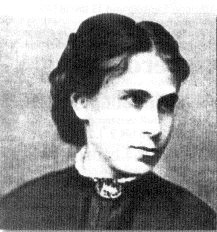Nadia is a female name. Variations include Nadja, Nadya, Nadine, Nadiya, and Nadiia. Most variations of the name are derived from Arabic, Slavic languages, or both.
Aanya, Anya, Ania or Anja is a given name. The names are feminine in most East European countries and unisex in several African countries.

Anne, alternatively spelled Ann, is a form of the Latin female name Anna. This in turn is a representation of the Hebrew Hannah, which means 'favour' or 'grace'. Related names include Annie.
The surname Rasmussen is a Danish and Norwegian surname, meaning Rasmus' son. It is the ninth-most-common surname in Denmark, shared by about 1.9% of the population.

Agnes is a feminine given name derived from the Greek Ἁγνή Hagnḗ, meaning 'pure' or 'holy'. The name passed to Italian as Agnese, to French as Agnès, to Portuguese as Inês, and to Spanish as Inés. It is also written as "Agness". The Greek name descends from the Proto-Indo-European *h₁yaǵ-, meaning 'to sacrifice; to worship', from which also the Vedic term yajña originates. The name is mostly used in Greece and in countries that speak Germanic languages.
Pedersen is a Danish and Norwegian patronymic surname, literally meaning "son of Peder". It is the fifth most common surname in Denmark, shared by about 3.4% of the population, and the sixth most common in Norway. It is of similar origin as the surname Petersen.
Henning is a surname, also used as a given name, with origins in East Prussia.
Jansen is a Dutch/Flemish and Low German patronymic surname meaning son of Jan, a common derivative of Johannes. It is equivalent to the English surname Johnson. The near homonyms "Jensen" and "Jansson" are its Danish, Norwegian and Swedish counterparts.
The masculine given name Sander is a variant of Alexander, used in the Dutch-speaking areas of Europe, as well as Norway and Estonia. As of 1 January 2021, it is the 34th most common masculine given name in Estonia. The feminine version is Sandra; there is another masculine version in some countries: Sandro.

Tina is a largely feminine given name that originated as a diminutive for names ending in -tina such as Christina. Teena and Tena are modern English variant spellings of Tina. Tiina is an Estonian and Finnish variant. Tine is a Danish and Norwegian variant. Its masculine counterpart is Tino, Tin, or the Slovene Tine.
The name Kai has various origins and meanings in different cultures:
Rune is a unisex, though predominantly masculine given name derived from the Old Norse word rún, meaning "secret". It is earliest attested in a runestone as runi. It is a common name in Norway, Sweden, Denmark, and popular in Belgium, where it ranked in top thirty names for baby boys in 2006 and was the tenth most popular name for boys in 2006 in the Flemish Region of Belgium. Rúni, a variant of the name, was among the ten most popular names given to baby boys in the Faroe Islands, Denmark, in 2007. In the United States, Rune is a much less common name- in 2021 there were only 35 baby boys and only 9 baby girls named Rune. Notable people with the name include:
Stine is a name. Notable people with the name include:
Nina is a feminine given name with various origins and alternate spellings accordingly. Nina may also serve as a short form of names ending in "-nina/-ina", such as Clementina, Christina, or Giannina. It serves as a diminutive of the variation of nevertheless original form of Hebrew name, “Johannah”, or “Joanina”.
Events from the year 1979 in Denmark.
Lund is a common surname, principally of Danish, Swedish, Norwegian and English origin. As a common noun lund means grove in all North Germanic languages. Lund can be English and can be Scandinavian surname. Also Scandinavian and English surnames can have a particle lund. Lund may refer to:
Heidi is a Germanic feminine given name. It became an internationally popular first name as a direct result of the Swiss children's book, Heidi. It can sometimes be an affectionate diminutive of the name Adelheid, which means "nobility" or, more loosely, "of noble birth". The name began to be used in the English-speaking world shortly after the 1937 Shirley Temple movie adaptation of the novel. In German-speaking countries, Heidi is also used as a diminutive for other names, such as Heidrun, Heidelinde, and Heidemarie.

Anton is a masculine given name. It is derived from the Latin name Antonius, and used in various languages. Notable people and characters with the name include:
Kristine variant of Christine, is a feminine given name. It may refer to:
Aryan also spelled Ariyan, Arian, Aryann, Arian or Aaryan is a given name and surname that is popular in India and Iran. The name Aryan is derived from the Sanskrit (ārya) meaning "noble and educated". In the Anglosphere, the name has negative connotations to many due to the Nazi racial theories about the superiority of the so-called Aryan race and modern usage of the term by white supremacist organization Aryan Nations.



